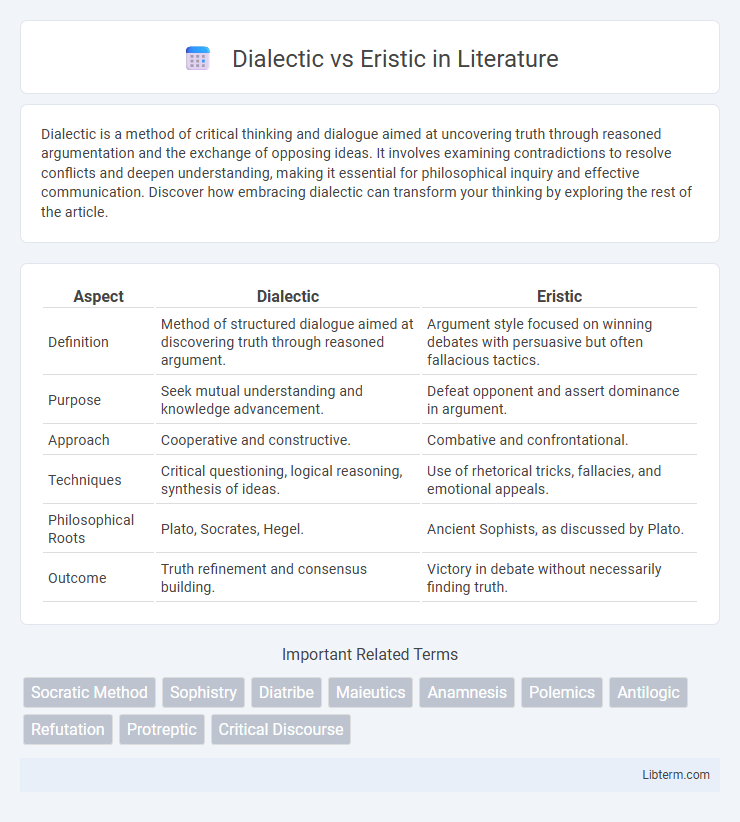Dialectic is a method of critical thinking and dialogue aimed at uncovering truth through reasoned argumentation and the exchange of opposing ideas. It involves examining contradictions to resolve conflicts and deepen understanding, making it essential for philosophical inquiry and effective communication. Discover how embracing dialectic can transform your thinking by exploring the rest of the article.
Table of Comparison
| Aspect | Dialectic | Eristic |
|---|---|---|
| Definition | Method of structured dialogue aimed at discovering truth through reasoned argument. | Argument style focused on winning debates with persuasive but often fallacious tactics. |
| Purpose | Seek mutual understanding and knowledge advancement. | Defeat opponent and assert dominance in argument. |
| Approach | Cooperative and constructive. | Combative and confrontational. |
| Techniques | Critical questioning, logical reasoning, synthesis of ideas. | Use of rhetorical tricks, fallacies, and emotional appeals. |
| Philosophical Roots | Plato, Socrates, Hegel. | Ancient Sophists, as discussed by Plato. |
| Outcome | Truth refinement and consensus building. | Victory in debate without necessarily finding truth. |
Understanding Dialectic: A Philosophical Foundation
Dialectic, rooted in the Socratic tradition, serves as a method of seeking truth through reasoned dialogue and critical questioning, contrasting with eristic debate that aims to win arguments regardless of truth. This philosophical foundation emphasizes constructive engagement, encouraging participants to refine ideas and uncover deeper insights. Understanding dialectic fosters intellectual humility and collaborative knowledge-building, essential for genuine philosophical inquiry and effective problem-solving.
Defining Eristic: Argument for Argument’s Sake
Eristic centers on debate aimed at winning rather than discovering truth, emphasizing persuasive tactics over logical coherence. It prioritizes rhetorical skill and emotional appeal, often sacrificing accuracy and constructive dialogue. This approach contrasts with dialectic, where the goal is collaborative truth-seeking through reasoned discussion.
Historical Roots: Dialectic and Eristic in Ancient Thought
Dialectic and eristic trace their origins to ancient Greek philosophy, with dialectic rooted in Socratic and Platonic traditions emphasizing cooperative truth-seeking dialogue. Eristic, conversely, was prominent in sophist practices, focusing on argumentative victory rather than genuine understanding. The philosophical contrast between dialectic's pursuit of knowledge and eristic's competitive debate defined classical approaches to rhetoric and logic.
Goals of Dialectic vs. Eristic Approaches
Dialectic aims to uncover truth and achieve mutual understanding through reasoned dialogue, fostering collaborative problem-solving and intellectual progress. Eristic focuses on winning arguments and defeating opponents, often prioritizing rhetorical skill over objective truth. The primary goal of dialectic is constructive knowledge-building, while eristic seeks competitive victory in debate.
Methods of Reasoning: Cooperation vs. Competition
Dialectic employs cooperative reasoning methods aimed at mutual understanding and truth-seeking by engaging participants in constructive dialogue and questioning. Eristic relies on competitive reasoning strategies designed to win arguments through rhetorical tactics and persuasion, often prioritizing victory over truth. These contrasting approaches highlight dialectic's emphasis on collaboration and eristic's focus on adversarial debate.
Types of Discourse in Dialectic and Eristic
Dialectic discourse centers on cooperative dialogue that seeks truth through reasoned argument, typically involving thesis, antithesis, and synthesis to refine understanding. Eristic discourse, in contrast, prioritizes winning arguments and often uses rhetorical strategies, fallacies, or emotional appeals, emphasizing debate over truth. Types of dialectic include Socratic questioning and Hegelian dialectics, while eristic discourse features competitive debate and sophistry.
The Role of Truth: Seeking vs. Defeating
Dialectic emphasizes the pursuit of truth through reasoned dialogue and critical questioning, aiming for mutual understanding and knowledge advancement. Eristic focuses on argumentation designed to defeat an opponent, prioritizing winning over discovering objective truth. This fundamental difference highlights dialectic as a cooperative search for validity, whereas eristic embodies competitive disputation driven by rhetorical victory.
Dialectic and Eristic in Modern Debate
Dialectic in modern debate emphasizes structured dialogue aimed at discovering truth through reasoned argument and critical questioning, fostering mutual understanding and consensus. Eristic prioritizes winning the argument by any means, often employing rhetorical tactics, fallacies, and emotional appeals to undermine opponents rather than seeking objective truth. Contemporary debate formats favor dialectic techniques to encourage constructive discourse, while recognizing eristic strategies as barriers to productive communication.
Practical Consequences in Communication
Dialectic fosters constructive dialogue by prioritizing reasoned argumentation aimed at reaching truth or mutual understanding, which enhances clarity and problem-solving in communication. Eristic, centered on winning debates and defeating opponents, often leads to conflicts and misunderstandings, undermining effective information exchange and relationship-building. Recognizing these differences influences communication strategies in fields like negotiation, education, and conflict resolution.
Choosing Between Dialectic and Eristic: A Contextual Guide
Choosing between dialectic and eristic depends on the goal of the conversation--dialectic aims for cooperative truth-seeking through reasoned dialogue, while eristic focuses on winning arguments, often through rhetorical tactics. In academic, philosophical, or problem-solving contexts, dialectic fosters understanding and consensus, making it the preferred method for constructive debates. Eristic may be more appropriate in competitive or persuasive settings where the priority is to prevail rather than to achieve mutual insight.
Dialectic Infographic

 libterm.com
libterm.com